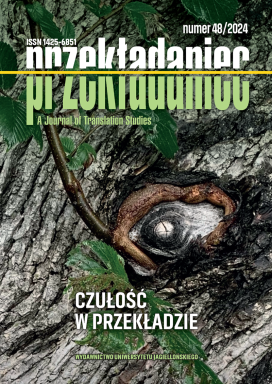„Przekładać bez cishetowania” – o dylematach tłumaczy literatury queerowej
“Translating without Cishetting” – About the Dilemmas of a Translator(ess) of Queer Literature
Author(s): Kinga MatuszkoSubject(s): Gender Studies, Translation Studies
Published by: Wydawnictwo Uniwersytetu Jagiellońskiego
Keywords: translation; non-binary; queer literature; transgender;
Summary/Abstract: According to Elżbieta Tabakowska, it is the duty of translators to empathize not only withthe authors of the translated texts, but also with their heroes and recipients. This statementis correct especially in the perspective of contemporary cultural and socio-politicalconditions reflected in the texts of culture, and thus – in translation. It is confirmed byinterviews with translators, in which they indicate how important the ongoing socialchanges are for them, the effects of which they must include in translations, which isnot necessarily allowed by the specificity of the Polish language – in other words, theyemphasize a certain “lack” in it. This “lack” – or rather sensitivity to its existence – can beconsidered in the context of tenderness, which is particularly important in the practice offeminist and queer translations, focused on giving voice to those who have been deprivedof it for many years. There is also an ideological element here – “tenderness” understoodin this way would be conditioned by transferring one’s own perspective into the text – e.g.,resulting from the ease of identification of the translator with the characters. The aim ofthe article is an attempt to indicate why translators want to compensate for this „lack”and how they do it. Contemporary novels are the subject of reflection – The Many Half-Lived Lives of Sam Sylvester by Maya MacGregor, I Wish You All The Best by MasonDeaver, Detransition, Baby by Torrey Peters – and the reportage Girl, Woman, Otherby Bernardine Evaristo and their Polish translations belonging to the so-called queerliterature, in which one can observe various ways of showing compassion, giving voiceto heroes and narrators by translators, influencing the possibility of self-identification.An important context for my considerations are conversations with translators – AgaZano and Artur Łuksza.
Journal: Przekładaniec.
- Issue Year: 2024
- Issue No: 48
- Page Range: 85 - 99
- Page Count: 15
- Language: Polish

